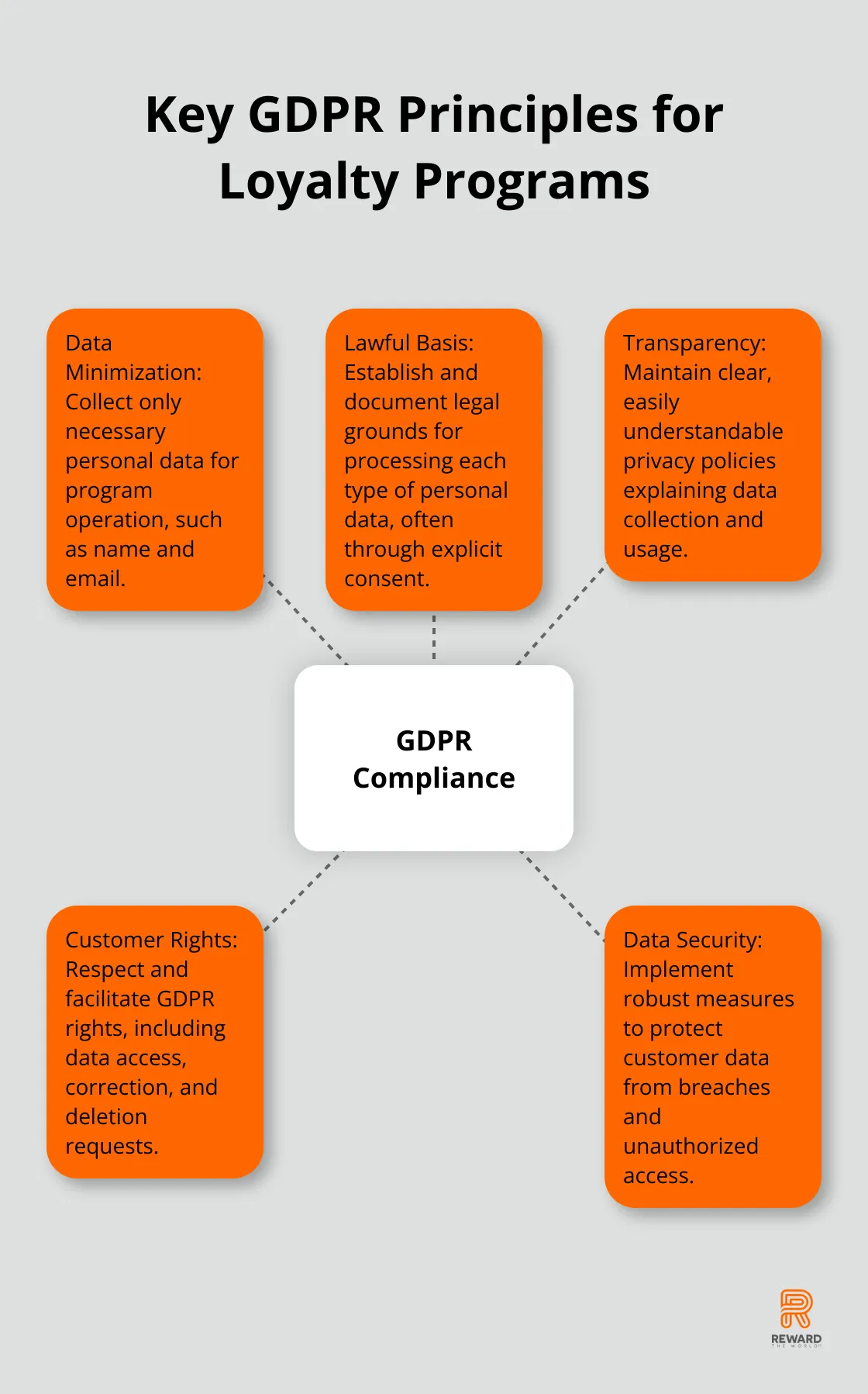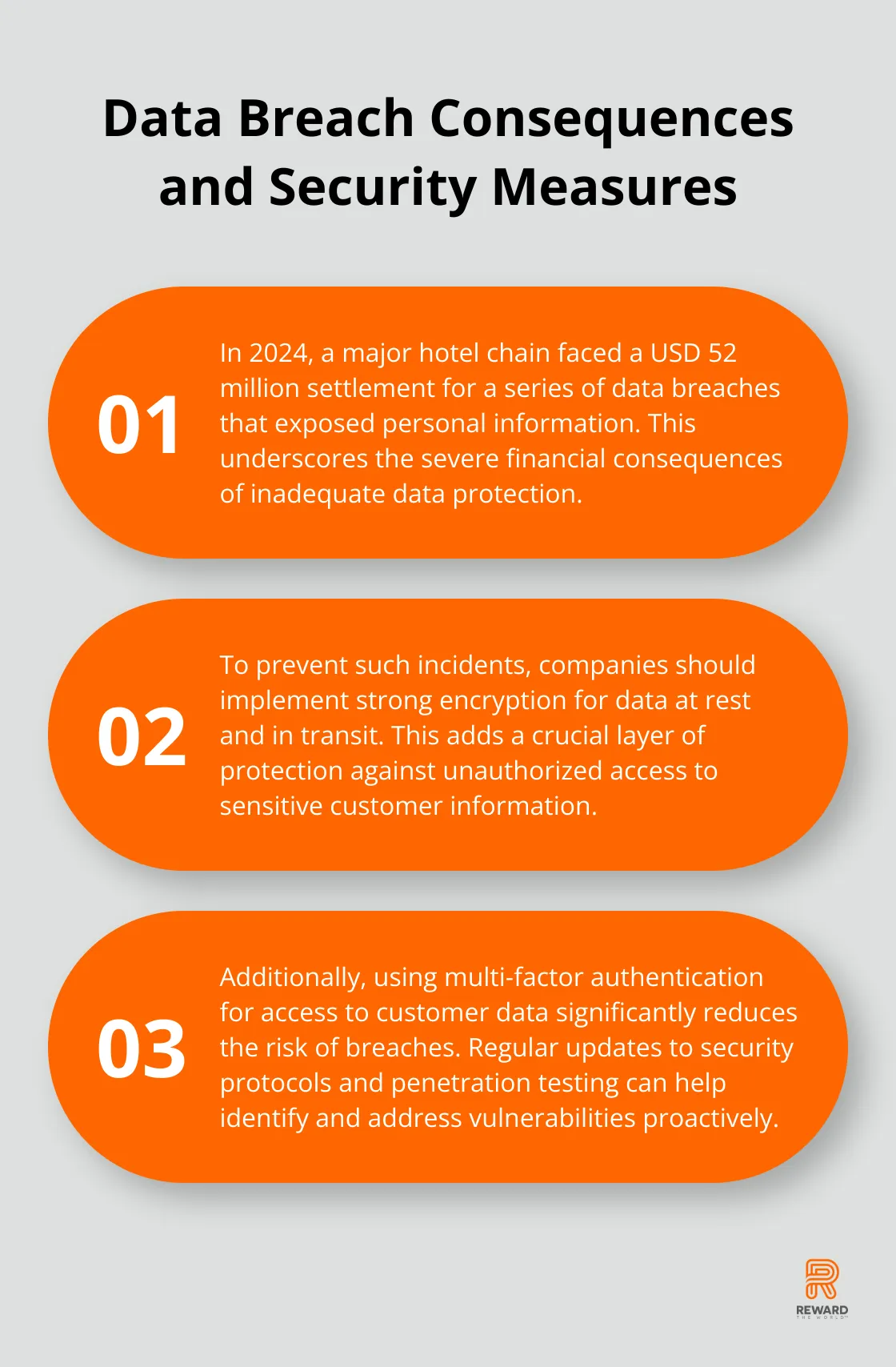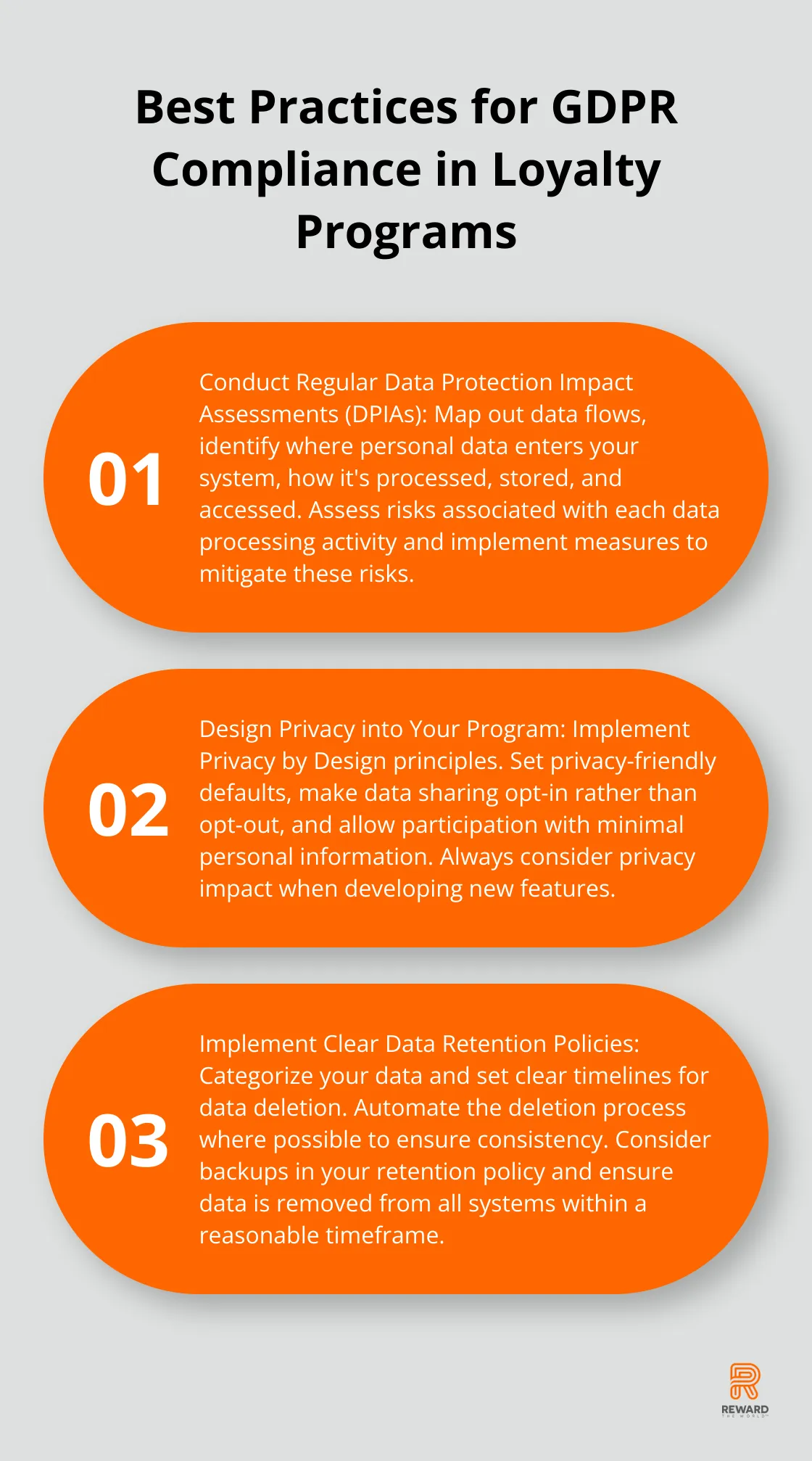
GDPR compliance in loyalty programs is a complex challenge that demands careful navigation. At Reward the World, we’ve seen firsthand how data privacy regulations can impact customer engagement strategies.
This blog post will guide you through the key GDPR principles, common pitfalls, and best practices for loyalty programs in 2025. We’ll provide practical tips to help you maintain compliance while delivering value to your customers.
How Can Loyalty Programs Stay GDPR Compliant?
Minimize Data Collection
GDPR compliance is essential for loyalty programs. The first rule is data minimization. Collect only the personal data that’s absolutely necessary for your program’s operation. For example, a customer’s name and email for communication might suffice. Do you really need their home address or date of birth? Each additional piece of data increases your liability, so keep it lean.
Establish Lawful Basis for Processing
Every bit of personal data you process must have a lawful basis. For loyalty programs, this often means obtaining explicit consent from customers. However, consent isn’t always enough. You need to demonstrate why you’re allowed to use data, whether it’s through consent when someone signs up or another legal basis. Document your reasoning for each type of data you collect and process.
Ensure Transparency
Transparency is non-negotiable under GDPR. Your privacy policy should be easy to find and understand. Explain in plain language what data you’re collecting, why you’re collecting it, and how you’ll use it. Avoid legal jargon that might confuse your customers. Informed consent is key – customers should know exactly what they’re signing up for when they join your loyalty program.

Respect Customer Rights
GDPR gives individuals strong rights over their personal data. Make sure your loyalty program respects these rights. Loyalty program members are well protected under GDPR, with rights including the right to be informed. Provide easy ways for customers to access their data, correct inaccuracies, and request deletion. If a customer wants to leave your program, implement a clear process for removing their data from your systems.
In practice, this means creating user-friendly interfaces where customers can view and manage their data preferences. It also involves training your customer service team to handle data-related requests promptly and efficiently.
Implement Strong Security Measures
Data security is paramount under GDPR. Implement robust measures to protect customer data from breaches and unauthorized access. This includes encryption, access controls, and regular security audits. Don’t forget about physical security measures for any paper records or storage devices containing personal data.
GDPR-compliant loyalty programs often see higher engagement rates because customers feel more comfortable sharing their data when they know it’s handled responsibly. However, compliance is an ongoing process. The next section will explore common pitfalls that loyalty programs should avoid to maintain GDPR compliance.
What Are Common GDPR Pitfalls in Loyalty Programs?
Excessive Data Collection
Many loyalty programs collect more data than necessary. They request information like birthdays, addresses, or social media handles when simpler data points would suffice. This practice violates GDPR’s data minimization principle and increases the risk of data breaches.
To avoid this, businesses should regularly audit their data collection practices. They need to ask: “Is this information essential for our loyalty program’s operation?” If not, they should stop collecting it.
Unclear Privacy Policies
Vague or complex privacy policies confuse customers and lead to uninformed consent.
To address this issue, businesses should write their privacy policies in plain language. They need to explain clearly what data they collect, why they collect it, and how they use it. The use of infographics or videos can make the information more digestible (and more engaging for users).
Weak Data Security
Insufficient data security measures can result in severe consequences. In 2024, a major hotel chain faced a USD 52 million settlement for a series of data breaches that exposed personal information. This incident underscores the importance of robust security measures.

Companies should implement strong encryption for data at rest and in transit. They need to use multi-factor authentication for access to customer data. Regular updates to security protocols and penetration testing can help identify vulnerabilities.
Non-Compliant Partnerships
Many loyalty programs partner with third-party service providers but fail to ensure these partners are GDPR compliant. Companies remain responsible for their customers’ data, even when it’s in the hands of a partner.
Before entering any partnership, businesses should conduct thorough due diligence. They need to request GDPR compliance certificates and include data protection clauses in their contracts. Regular audits of partners’ data handling practices are essential.
Inadequate Staff Training
A often overlooked pitfall is the lack of proper GDPR training for staff. Employees who handle customer data need to understand GDPR requirements and their role in maintaining compliance.
Companies should invest in regular GDPR training sessions for all staff members who interact with customer data. This training should cover data protection principles, handling of customer requests (such as data access or deletion), and procedures for reporting potential data breaches.
The landscape of data protection is ever-evolving, and staying compliant requires constant vigilance. In the next section, we’ll explore best practices that can help loyalty programs navigate these challenges and maintain GDPR compliance effectively.
How to Implement GDPR Best Practices in Loyalty Programs
Conduct Regular Data Protection Impact Assessments
Data Protection Impact Assessments (DPIAs) identify and mitigate privacy risks. For loyalty programs, these regulations require explicit consent before collecting personal data. They also mandate giving customers the right to access their data.
Map out your data flows. Identify where personal data enters your system, how you process it, where you store it, and who accesses it. This exercise often reveals unnecessary data collection or processing that you can eliminate.
Assess the risks associated with each data processing activity. Consider both the likelihood and severity of potential harm to individuals if their data were compromised. For example, storing credit card information carries a higher risk than email addresses.
Based on your risk assessment, implement measures to mitigate these risks. This might involve encrypting sensitive data, limiting access to personal information, or anonymizing data where possible.

Design Privacy into Your Program
Privacy by Design builds GDPR compliance into the core of your loyalty program.
Set privacy-friendly defaults. Make data sharing opt-in rather than opt-out. Allow users to participate in your loyalty program with minimal personal information.
When developing new features, always ask: “How does this impact user privacy?” Consider less data-intensive alternatives that can achieve the same business goal.
Implement data minimization techniques. For example, if you only need to know a customer’s age range for marketing purposes, don’t collect their exact birth date. Instead, let them select an age bracket.
Prioritize Staff Training
Your employees are your first line of defense against GDPR violations. Regular, comprehensive training is essential.
Create role-specific training modules. Your marketing team needs different GDPR knowledge than your IT department. Tailor the content accordingly.
Use real-world scenarios in your training. For instance, walk your customer service team through the process of handling a data access request. This practical approach helps employees understand how GDPR applies to their daily work.
Train temporary staff and contractors. Anyone who handles personal data needs to understand their GDPR responsibilities.
Implement Clear Data Retention Policies
Data retention is a key aspect of GDPR compliance that many loyalty programs overlook. Keeping data longer than necessary increases your risk exposure.
Categorize your data. Different types of information may have different retention periods. For example, transaction data might need to be kept longer for tax purposes than marketing preferences.
Set clear timelines for data deletion. Automate this process where possible to ensure consistency. Stay compliant with 2025 data privacy laws by learning key regulations, marketer tips, and strategies to protect consumer data and build trust.
Consider backups in your retention policy. Ensure that when you delete data from your main systems, you also remove it from all backups within a reasonable timeframe.
Stay Informed and Adapt
The data protection landscape evolves constantly. Stay informed about changes in regulations and adapt your practices accordingly.
Subscribe to reputable data protection newsletters (such as those from data protection authorities). Attend industry conferences and webinars to learn about emerging trends and best practices.
Regularly review and update your GDPR compliance strategy. This might involve reassessing your data processing activities, updating your privacy policy, or implementing new security measures.
Try to foster a culture of privacy within your organization. Encourage employees to report potential data protection issues and reward proactive privacy-enhancing initiatives.
Final Thoughts
GDPR compliance in loyalty programs presents significant challenges for businesses in 2025. Companies must address data minimization, lawful processing, transparency, and customer rights to avoid severe consequences. Regular assessments, privacy-by-design approaches, staff training, and clear data retention policies form the foundation of a robust compliance strategy.
Data privacy will remain a critical concern for consumers and regulators. Loyalty programs must evolve to meet changing expectations while delivering value. This requires innovative technologies and strategies that prioritize data protection without compromising user experience.
Reward the World offers a global incentives platform designed with data privacy in mind. Our solution helps companies navigate the complex landscape of data protection while driving engagement and performance. The future favors those who balance the power of data with the imperative of privacy, creating trust-based relationships that endure.
